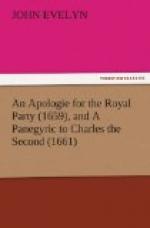The Apologie for the Royal Party contains an eloquent and outspoken attack upon the parliamentary party, the depth of the author’s feelings making his style of writing more effective than it usually was.
Events were at this date nearing their climax, and Evelyn, soon after the publication of his pamphlet, made persistent attempts to induce Colonel Henry Morley, then Lieutenant of the Tower of London, to declare for the King. In the edition of Baker’s Chronicle of the Kings of England, edited by Edward Phillips, 1665, is given the following account of the negotiations (p. 736): “Mr. Evelyn gave him [Col. Morley] some visits to attemper his affection by degrees to a confidence in him, & then by consequence to ingage him in his designes; and to induce him the more powerfully thereunto, he put into his hands an excellent and unanswerable hardy treatise by him written and severall times reprinted, intituled An Apology for the Royall Party, which he backed with so good Argument and dextrous Addresses in the prosecution of them, that, after some private discourse, the Colonel was so well inclin’d, as to recommend to him the procurement of his Majestie’s Grace for him, his Brother-in-law Mr. Fagg, and one or two more of his Relations”. Phillips added an account of a letter written by Evelyn to Colonel Morley, and gave him great credit for the influence which he exerted, though Evelyn endorsed a draft of the narrative with a statement saying there “was too much said concerning me”. Nevertheless part of the narrative was confirmed by Evelyn when he wrote on the title-page of the copy of the pamphlet here reproduced: “Delivered to Coll. Morley a few daies after his contest w^th Lambert in the palace yard by J. Evelyn”. The “contest” with General Lambert took place on October 12 or 13 when Morley, pistol in hand, refused to allow him at the head of his troops to pass through the Palace Yard.




